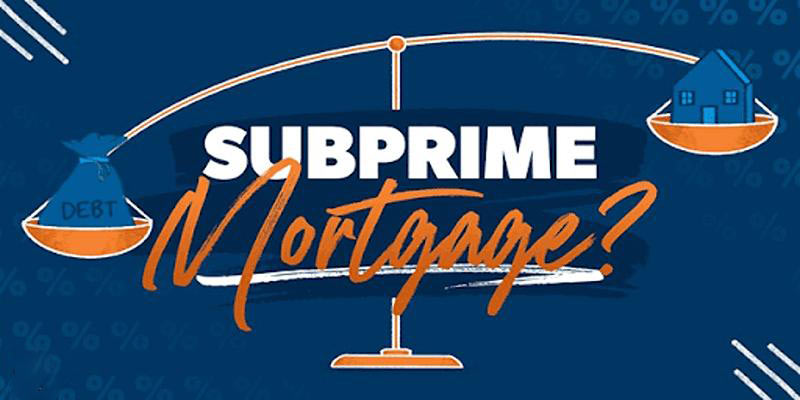Best Mortgage Lenders Of 2023 If You Have A Bad Credit
Nov 22, 2024 By Kelly Walker
If you're someone with bad credit, the thought of getting a mortgage may seem like a distant dream. But it doesn't have to be - there are lenders out there that specialize in loans for people with poor credit histories. Whether you’re looking to buy your first home or refinance an existing loan, these days there's no need to despair if your credit score isn't perfect. Discover the best mortgage lenders for bad credit and unlock the financial freedom you've been searching for!
Understanding Your Credit Score and How It Affects Your Mortgage Options:
If you're thinking of buying a home anytime soon, it's essential to understand how your credit score affects your mortgage options. Your credit score is a numerical representation of how creditworthy you are, and it can have a significant impact on your ability to obtain a mortgage, as well as the interest rate you receive. A low credit score can make it difficult to get approved for a mortgage, while a high score can help you secure favorable terms and save thousands of dollars over the life of the loan. So, if you're serious about buying a home, it's essential to take steps to improve your credit score and ensure you have the best possible options available to you.
What Are the Best Mortgage Lenders for Bad Credit Borrowers:
Buying a home can be an exciting and overwhelming experience. However, the process can become even more frustrating if you have bad credit. Fortunately, there are many mortgage lenders out there that are willing to work with bad credit borrowers. It's important to do your research and find the best lenders for your unique financial situation. Look for lenders that offer low-interest rates, flexible repayment terms, and less strict credit requirements. With some determination and the right lender, it's possible to make your dream of owning a home a reality.
Do Your Research to Find the Best Terms?

When it comes to making important financial decisions such as choosing a loan or credit card, it's crucial to do your research and find the best terms available. This means taking the time to compare interest rates, fees, and other factors that could impact your finances over the long term. With so much information available online, it's easier than ever to compare different products and find the ones that best suit your needs. By doing your due diligence and taking the time to research your options, you can ensure that you're making an informed decision and setting yourself up for financial success.
Analyze Your Finances and Calculate Monthly Payments:
Money can be a tricky subject, and often times we don't want to face the reality of our spending habits. However, analyzing your finances can be the key to a successful financial future. Take a deep breath and dive into your bank statements, credit card bills, and any other financial obligations you have. Once you have a clear picture of where your money is going, it's time to calculate those monthly payments.
This may seem daunting, but it's important to understand what you can afford and what adjustments you may need to make. With a little bit of effort and organization, you'll be able to take control of your finances and set yourself up for a successful financial future.
Different Types of Loans Available:

When it comes to borrowing money, there are a plethora of loan options available. Each type of loan has its own set of advantages and disadvantages, making it essential to understand them thoroughly before deciding which loan to choose. Some common types of loans include personal loans, secured loans, payday loans, and student loans.
Personal loans are versatile and can be used for various reasons, whereas secured loans require collateral in the event of non-payment. Meanwhile, payday loans typically have high-interest rates, and student loans are geared towards education expenses. By understanding the different types of loans available, you can make an informed decision on which loan is best suited for your specific needs.
Reach Out to Local Banks or Credit Unions for Additional Options:
When it comes to finding financial options, many people tend to overlook local banks and credit unions. However, reaching out to these institutions can offer a range of benefits. Local banks and credit unions often provide more personalized services, as they have a stronger focus on building relationships with their customers. Additionally, they may offer lower fees and interest rates on loans and credit cards. By reaching out to local banks and credit unions, you can discover additional financial options that may better meet your needs. So why not consider these institutions and see what they can offer you?
Conclusion:
To sum up, getting a mortgage with bad credit requires some effort and financial responsibility on your part. Doing research and understanding the different types of loan available can help you make an informed decision on which mortgage lender to go with. You’ll also need to understand your credit score and how that affects your options in terms of what rates, payments and debt-to-income ratio you’ll have. Additionally, analyzing your current financial standings is beneficial to prepare for monthly payments or loaning out any money at all. Last but not least, don’t forget to seek out/reach out to local banks or credit unions as they may have better terms than large lenders or brokers.
FAQs:
How do I improve my credit score?
You can improve your credit score by making on-time payments and paying off debt. Additionally, you may want to consider a secured credit card or loan to help build and maintain good credit.
What is the best type of loan for bad credit?
Secured loans are usually the best option for those with bad credit, since they require collateral and generally have lower interest rates and fees. However, it's important to shop around and compare different loan options to find one that best fits your needs.
What is debt-to-income ratio?
Debt-to-income ratio is a calculation of how much debt you have relative to your income. It's used to determine whether or not you can handle taking on more debt, such as a mortgage. Generally, lenders prefer to see a debt-to-income ratio that is 36% or lower.

Medical vs. Financial Power of Attorney: What You Need to

What Is a Subprime Mortgage?

The Ins and Outs of the Child and Dependent Care Tax Credit

How Home Construction Loans Work

Best Mortgage Lenders Of 2023 If You Have A Bad Credit

How to Start Trading Early

Unitranche Debt: An Overview

How to Calculate Marginal Propensity to Save

A Closer Look at Form 8606 and its Implications

